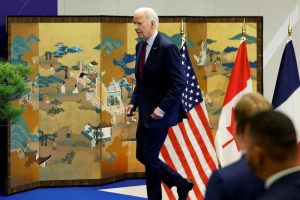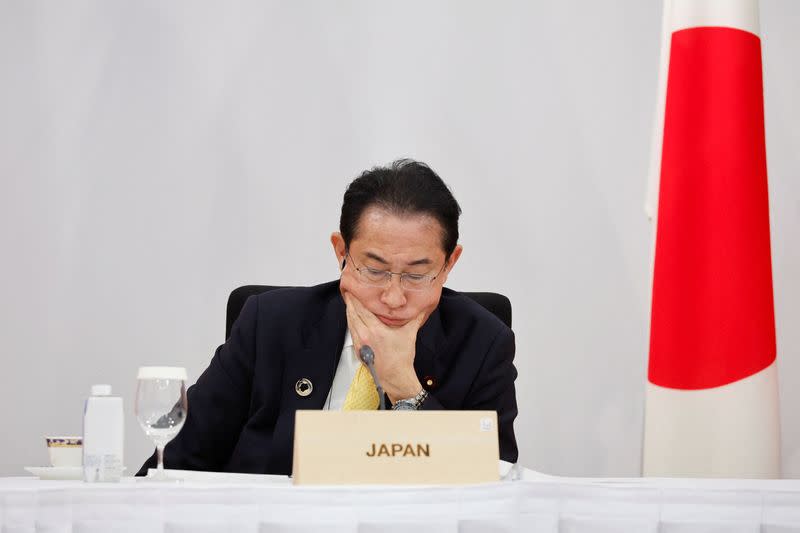China’s state mouthpiece Global Times hit back at Japan and G7 nations on Monday, saying their summit in Hiroshima was like an “anti-China workshop”.
Beijing summoned Japan’s envoy and berated Britain in a defiant response to a joint statement issued on the weekend that condemned China for economic coercion and issues ranging from Taiwan to maritime claims and human rights.
“The US is pushing hard to weave an anti-China net in the Western world,” Global Times said in an editorial on Monday titled ‘G7 has descended into an anti-China workshop’.
“This is not just a matter of brutal interference in China’s internal affairs and smearing China, but also an undisguised urge for confrontation between the camps”.
ALSO SEE:
Chinese Warships Circling Japan After Taiwan Remarks – CNN
Anger at Japan, but Biden expects ties to thaw
Beijing’s foreign ministry said it firmly opposed the G7 statement and noted late on Sunday that it had summoned Japan’s ambassador to China as part of its protest to the summit host.
Russia, a close ally of China that was also called out in the G7 statement over its invasion of Ukraine, said the summit was an “incubator” for anti-Russian and anti-Chinese hysteria.
Separately, China’s embassy in Britain urged London to stop slandering China on Sunday, after British Prime Minister Rishi Sunak said Beijing represents the world’s greatest challenge to security and prosperity.
Despite Beijing’s pointed reaction, US President Joe Biden said he expected a thaw in frosty relations with China “very shortly”. The Group of Seven (G7) also includes Canada, France, Germany and Italy.
Chinese Vice Foreign Minister Sun Weidong summoned the Japanese ambassador to register protests over “hype around China-related issues”, a ministry statement late on Sunday said.
Sun said Japan collaborated with the other countries at the G7 summit “to smear and attack China, grossly interfering in China’s internal affairs, violating the basic principles of international law and the spirit of the four political documents between China and Japan,” referring to the China-Japan Joint Statement of 1972.
He said Japan’s actions were detrimental to China’s sovereignty, security and development interests, and that China is “strongly dissatisfied and firmly opposes” them.
Hideo Tarumi, Japanese ambassador to China, said it was “natural” for the G7 to refer to issues of common concern and it would continue to do if China does not change its behaviour.
‘We should have a hotline’

Meanwhile, US President Joe Biden said G7 nations had agreed a united approach to China that called for diversifying supply chains to reduce dependence on one country, and hinted that he could speak with China’s president soon.
“We’re not looking to decouple from China. We’re looking to de-risk and diversify our relationship with China,” Biden told a press conference after the three-day summit.
He said G7 nations were more unified than ever in terms of “resisting economic coercion together and countering harmful practices that hurt our workers.”
China’s embassy in Japan protested on Saturday and urged the G7 to stop creating confrontation and division.
Despite this, Biden said he expected a thaw in frosty relations with China “very shortly” after strains caused by an incident earlier this year when the United States shot down a Chinese balloon that flew over sensitive military sites.
“We should have an open hotline,” Biden said. He said he had agreed with Chinese President Xi Jinping during a G20 summit in Bali last year to keep communications open, but everything changed after “this silly balloon that was carrying two freight cars worth of spying equipment.”
Biden suggested a shift in US-China relations could occur soon, echoing his comment to reporters before his departure.
“In terms of talking with them, I think you’re going to see that thaw very shortly,” Biden said.
Keen to help Taiwan ‘defend themselves’
On the issue of tensions between China and Taiwan, Biden said there was a clear understanding among most allies that if China were to act unilaterally against the self-governed island Taiwan, there would be a response.
“We’re not going to tell China what they can do,” he said, “But in the meantime we’re going to put Taiwan in a position where they can defend themselves.”
Taiwan’s President Tsai Ing-wen vowed on Saturday to maintain the status quo of peace and stability across the Taiwan Strait amid high tensions with China, which has stepped up military pressure on the democratically governed island.
Biden reiterated that the United States and G7 allies would not trade in materials that would allow China to build weapons of mass destruction, but insisted that was “not a hostile act.”
He said he would not considering easing restrictions on China on those materials, but it was under negotiation whether to ease sanctions on Chinese General Li Shangfu, who was named in March as China’s new defence minister.
- Reuters with additional editing by Jim Pollard
ALSO SEE:
China Will Still Get Big Investments From West, Scholz Says
G7 Leaders Seek to ‘De-Risk, Not Decouple’ From China
China’s Commerce Minister to Meet US Trade Chiefs Next Week
China to Oppose Any Investment Ban on High-Tech Industries
China Raids Office of US Due Diligence Firm, Detains Staff
























